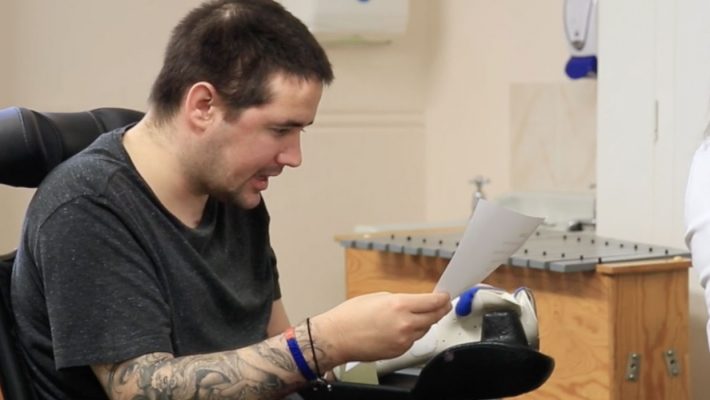£30,000 to improve diagnosis of emergence from a prolonged disorder of consciousness
 Researchers at the Royal Hospital for Neuro-disability (RHN) have secured £30,000 in funding from The Linder Foundation to continue their work into the understanding and improvement of diagnoses of patients emerging from prolonged disorders of consciousness (PDoC).
Researchers at the Royal Hospital for Neuro-disability (RHN) have secured £30,000 in funding from The Linder Foundation to continue their work into the understanding and improvement of diagnoses of patients emerging from prolonged disorders of consciousness (PDoC).
Over one million people suffer a head injury in the UK each year, and some who suffer severe brain injury are left in a PDoC, when they have a lack of awareness and the inability to engage with other people for a long period of time.
Amy Pundole, RHN Clinical Lead Speech and Language Therapist, is leading the research to investigate the tools currently used by clinicians to judge a patient’s “emergence”, from PDoC. This work builds on previous research led by Amy which found clinicians in the UK are not confident in the current tools used to determine if a patient is able to communicate again as they emerge from PDoC. Amy will go on to understand current practices and suggest improvements to diagnose the emergence from PDoC.
Amy said, “having worked with patients in PDoC and their families for over 15 years, it’s a real privilege to be able to carry out research to address some of the issues and questions that arise from families and team members when trying to determine if a patient is able to communicate again, to indicate they have emerged.
“The grant from The Linder Foundation will make a real difference, allowing me to purchase specialist equipment to make clear recordings of data collection sessions for analysis. It will also fund some of my time allowing me to focus on completing high quality research.”
Johnny Fountain, Chairman of The Linder Foundation said, “We are delighted to support this important research project and help clinicians at the Royal Hospital for Neuro-disability and further afield to improve diagnosis and understanding of an under-researched patient population.”
The funding from The Linder Foundation will allow Amy to investigate the tasks currently used with a range of stimuli to see which ones patients emerging from PDoC are most accurately able to respond to. The research will also see if any difference is made by having a family member present the tasks compared to a researcher. Finally, researchers will observe three patients on several occasions in a range of daily activities to gain detailed insights into which communication behaviours they are able use in day-to-day situations rather than specific tasks.
Despite some delays due to the Coronavirus pandemic, the research has gained ethical approval and data collection is due to start in March 2021.
ENDS
For further information please contact
Susan Patterson
Senior Digital Communications Officer
020 8780 4500 ext 5144
07387 257737
spatterson@rhn.org.uk
The Royal Hospital for Neuro-disability (RHN)
The RHN is a well-respected charity hospital and research centre, providing care for adults with brain injuries.
Founded in 1854, our Putney-based community provides specialist care, therapies and innovative technologies to meet the complex needs of people with profound disabilities. We pride ourselves on caring for our patients as individuals, offering hope, as well as practical and emotional support to them and their families.
www.rhn.org.uk | Facebook | Twitter | Instagram | LinkedIn
The Linder Foundation
The Linder Foundation (formerly the Enid Linder Foundation) is a Registered Charity, established by Enid Blanche Linder under a governing Deed of Trust in 1974. Since then, Trustees have developed the Settlor’s approach to charitable giving to suit the current needs of our society distributing grants to a wide variety of causes across science and the arts.
The Foundation has significant experience of supporting groundbreaking medical surgery and research, often providing seed funding for innovative projects which struggle to find the backing they desperately need. Grants have also been given to support and encourage young talent within music, theatre and the arts in general.
In addition to these causes, future funding will seek to focus on the issues central to society today: young people and the threats to the environment. Trustees strongly believe in nurturing the emotional and educational development of young people and wish to play a part in assisting those charitable institutions that address the harmful effects of human activity on the environment.
